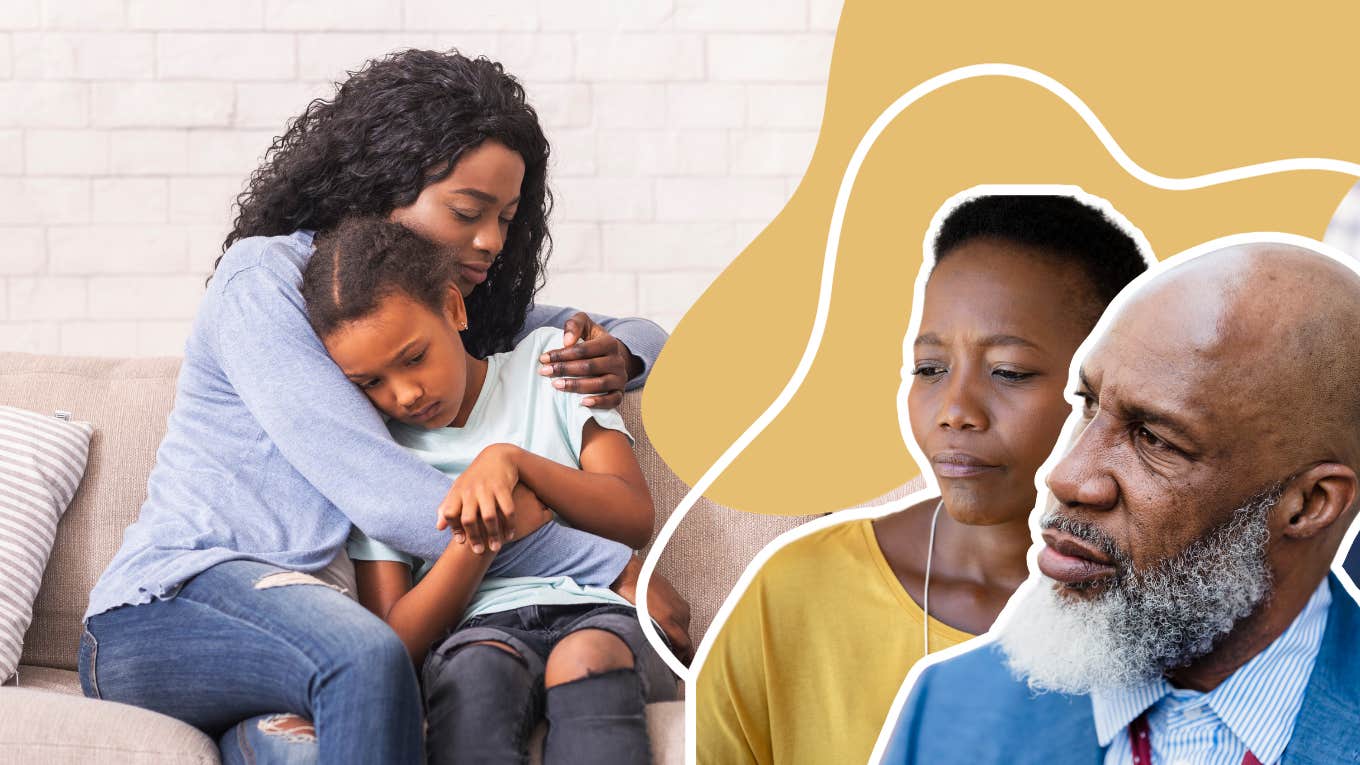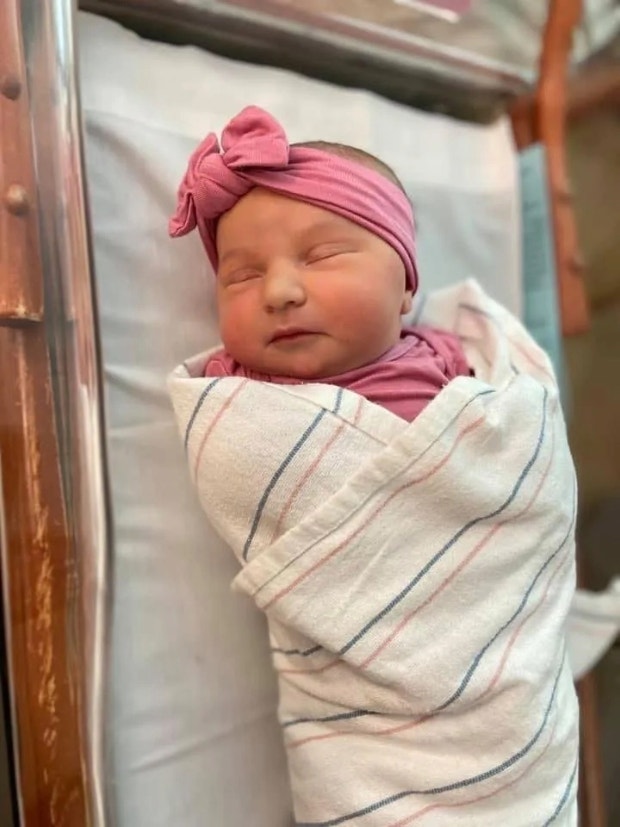My Parents Have Never Met My Daughter — On Purpose
I cut contact with my parents years ago because I refuse to have unhealthy people in my or my children’s lives.
 Konstantin Postumitenko | Prostock-studio / Ridofranz | Getty Images / Nicola Barts | Pexels
Konstantin Postumitenko | Prostock-studio / Ridofranz | Getty Images / Nicola Barts | Pexels My daughter was born on October 22, 2020, at 12:40 p.m.
The photo below is of her.
My parents have never seen this picture.
They may never.

Photo by author
Even if I hadn’t had this baby at the time of the COVID-19 pandemic, no one would have been hanging out in the waiting room to see her regardless. No two sets of grandparents playfully fighting for who gets to hold her first. No coos and baby talk and cell phones capturing hundreds of photos.
My husband’s parents both died years ago and my parents, very much alive, are dead to me.
Blood is thicker than water.
I can’t tell you how many times that aphorism has been quoted at me as if a few words from a stranger could shame me into mending anything.
Blood may be thicker than water, but water was there for me when blood wasn’t.
I was raised like everyone I know to "honor thy father and thy mother."
I’ve read, "The eye that mocks a father and scorns to obey a mother will be picked out by the ravens of the valley and eaten by the vultures." (Proverbs 30:17).
I know what’s expected of me as a daughter: to forgive my parents for their trespasses and to believe they did the best they could.
I’ve even been told, "You’ll understand what it was like for your parents when you become a parent yourself."
I’ve been a parent for over six years now. This baby is my third. Becoming a parent didn’t help me become sympathetic to my parents. Instead, it showed me why I shouldn’t let them be in my children’s lives at all.
One of my earliest memories of my mother is of her slapping me across the face. I was three or four. I don’t know what I did, but obviously the wrong thing. I started crying, and she told me she was sorry and hugged me.
That was one of the only times, in my entire life, I ever remember her apologizing for hurting me.
As a child, I told myself that all I needed to do was grow up.
If I just grow up, no one will beat me anymore. If I just grow up, I won’t have to live with the constant fear and anxiety of when I might next be hurt. If I just grow up and get out, I’ll be okay.
That was my childhood mantra. Just grow up.
My mother often pulled my hair. My mother often kicked me. My mother often spanked or smacked me with her hand or objects like a tennis racket, and, once, a metal mop. She once beat the length of both of my arms so that my forearms were bruised and I could barely hold a pencil for a week. But my mother always left bruises in places I could cover.
I never knew what might set her off. It could be something as innocuous as forgetting to load the dishwasher with the forks pointing up. Her only tell was the way the left side of her lip would curl up. When I saw that, I might try to run, but it was usually too late.
My oldest daughter is now six. I used to look at her constantly, trying to understand how I could hit or beat her, my own child.
Even when she’s been a terror, I’ve never once lashed out with my hands. The most I’ve ever done is growl at her to get in time-out. Even that might make my sweet little girl, who hates when anyone is upset at her, drop to her knees and whimper, "I don’t want you to be mad at me!"
I’ve thought, more than once, You don’t even know what it means for someone to be "mad" at you the way my mother was.
My father never hit me, but he didn’t protect me either. He traveled often for work. He was barely around. He’d sometimes threaten my mother with divorce, but he never followed through. They’ve now been married for almost 40 years.
For nearly the entirety of my childhood, my mother beat me, and my father pretended it wasn’t happening.
No, being a parent didn’t help me become sympathetic to my own parents.
I haven’t forgiven them either because they still pretend none of that happened, or when I’ve confronted my mother in the past, she just said, "I did the best I could."
That might be true, but I don’t have to forgive you for that.
I don’t have to let you in my children’s lives for that.
I don’t have to do anything because if your "best" includes beating your own child with a metal mop, then your "best" isn’t good enough to be around my family.
My parents knew I was pregnant. Though we’ve spoken only a handful of times since I cut off contact in 2018, my mother sent a group text to me and my father back in March, and I told them my news.
Neither one ever responded.
"I don’t want my mother to see pictures of the baby," I said to my husband as he was getting ready to upload our birth announcement on social media.
"What do you want me to do?" he asked.
"Make sure your privacy settings prevent anyone that’s not your friend from seeing it."
"Why don’t I just block her?" he asked.
"That works," I said.
He typed in her name, and I helped him find her profile.
"Look at her bio," he told me.
I read, "Mother to 2 daughters, Grandma to ______ & ______ [the names of my two older children]."
I huffed.
My littlest daughter, that pink baby burrito pictured above, may never meet my parents/her grandparents. There may be a time she wants to.
I don’t know what I’ll do when that happens, but I’d like to believe that I’ll tell my little girl that knowing her is a privilege and that privilege is never given to someone just because they’re "blood."
It has to be earned.
Being a child doesn’t have to hurt.
Every year more than 3 million reports of child abuse are made in the United States. According to the Childhelp National Child Abuse Hotline, 28.3 percent of adults report being physically abused as a child, and 10.6 percent of adults report being emotionally abused as a child.
Physical abuse of a child is when a parent or caregiver causes any non-accidental physical injury to a child, including striking, kicking, burning, biting, hair pulling, choking, throwing, shoving, whipping, or any other action that injures a child. Even if the caregiver didn’t mean to cause injury, when the child is injured it is abuse. When a parent or caregiver harms a child’s mental and social development or causes severe emotional harm, it is considered emotional abuse. While a single incident may be abuse, most often emotional abuse is a pattern of behavior that causes damage over time. There are many physical and behavioral signs of child abuse in both the child and the parent or caretaker.
To learn more about these signs, visit the Childhelp National Child Abuse Hotline’s website. If you suspect a child you know is being abused physically or emotionally, contact the Childhelp National Child Abuse Hotline for more resources at 1-800-4-A-CHILD.
Tara Blair Ball is a certified relationship coach and podcast co-host for the show, Breaking Free from Narcissistic Abuse. She’s also the author of three books: Grateful in Love, A Couple’s Goals Journal, and Reclaim & Recover: Heal from Toxic Relationships.
